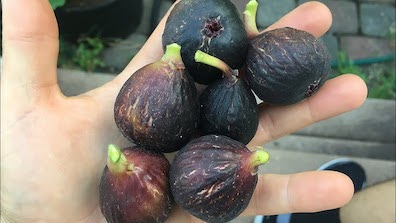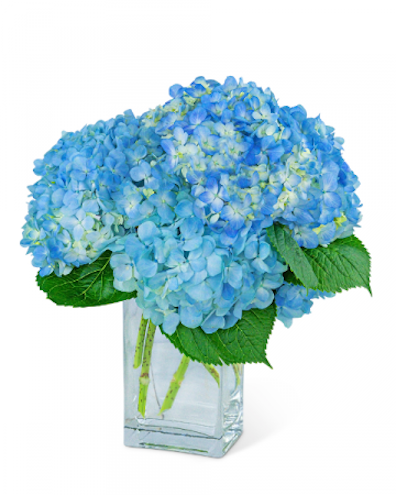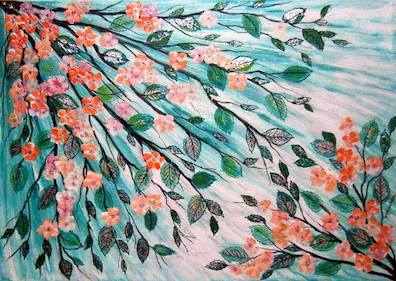The first example of the chapter's chipping away of language,
after the overture, comes in the third paragraph when Miss
Douce refers to "his ex," short for His Excellency. But
this instance hardly seems worth mentioning, since it merely
imitates Dublin slang. A far
more interesting man is introduced in the twentieth paragraph,
someone named Bloowho: "Bloowho went by by Moulang's
pipes bearing in his breast the sweets of sin, by Wine's
antiques, in memory bearing sweet sinful words, by Carroll's
dusky battered plate, for Raoul." "Who" is it? It's Bloom,
bearing in his breast both The Sweets of Sin and the
thought of how Molly will soon try out a better means of
satisfying her libidinal urges. He is sad—"Blue Bloom,"
as the narrative says later, and as the overture anticipates.
Boohoo.
This pitiful character seems to float free of his narrative
moorings when Miss Douce and Miss Kennedy gaily—one might even
say orgiastically—mock an unattractive old pharmacist. In an
uncanny dispersion of subjectivity, the name of the cuckold
Bloom intrudes on their sexually scornful conversation four
times, even though he is not present in the bar and they are not
thinking of him. One such intrusion occurs by displacement:
"— Married to the greasy nose! she yelled.... / Married to
Bloom, to
greaseaseabloom." Another involves a quick
camera cut to the Wellington Quay, where one learns that the
genitive of Bloowho is Bloowhose: "
Bloowhose dark eye
read Aaron Figatner's name.
Why do I always think Figather?
Gathering figs, I think." Bloom's
consciousness not only enters other people's sexual fantasies,
it also enters the universe of Joyce's word-play, turning
Figatner into a gatherer of figs.
Of course it is not only literary geniuses who hear puns in
words where none is intended. Everyone does it. Children trying
to make sense of "The consecrated cross I'll bear" come up with
"The constipated cross-eyed bear." People hearing Jimi Hendrix
sing "'Scuse me while I kiss the sky" wonder which guy he's
about to kiss. But from such obtuse mis-hearings to the sublime
sound-and-sense confusions of
Finnegans Wake there are
only a few degrees of separation. At the beginning of
Sirens
Joyce seems to be relying on the quite unremarkable Bloom to
help introduce the chapter's remarkable experiments with
language, which replace good straightforward sense with rhymes,
double meanings, and other polyphonic suggestions.
As "Bloo," Bloom (always associated with flowers in the novel)
now sounds like the color blue (always associated with sadness
in the popular imagination). Joyce contrives to bring the two
physically together by means of the table decorations in the
Ormond restaurant: "Clean tables, flowers, mitres of napkins."
When Blazes Boylan leaves for Eccles Street, heralded by the
jingling of the jaunting car's
bells, Bloom looks down on some blue flowers on the restaurant
table: "Bloom heard a jing, a little sound. He's off. Light sob
of breath
Bloom sighed on the silent bluehued flowers.
Jingling. He's gone. Jingle. Hear." The overture renders
this synesthetic mixture of color and sound: "
Jingle. Bloo."
Flowers spark another very striking association when Bloom is in
Daly's tobacco shop. Buying stationery on which to write a
letter to Martha, he thinks of the flower she enclosed in her
letter: "
Flower to console me and a pin cuts lo. Means
something, language of flow." The phrase "cuts lo" recalls
something he thought in
Lestrygonians: "Women won't pick
up pins. Say it cuts lo." Truncation is involved there too: "lo"
is short for "love," as Bloom is thinking of love being cut
short. By similarly truncating "flowers," Joyce introduces a
spectacular ambiguity. The
language
of flowers "Means something": it uses flowers to convey
secret romantic messages. But so too does "flow," if readers
trust their eyes and take it as the word that means "to move
like a stream." Most readers will do more than that. "Lo" looks
like it should be pronounced "low," and so the discovery of the
word "flow" is also encouraged by an expectation of rhyme.
Neither "lo" nor "flow" is pronounced that way in its
word-of-origin, but by such circuitous paths the language of
flowers becomes the language of flow-ers.
The double meaning is compelling because flowers move desire,
and
sexual desire, like music, is all
about flow: "Braintipped, cheek touched with flame, they
listened feeling that flow endearing flow over skin limbs human
heart soul spine"; "Bloom. Flood of warm jimjam lickitup
secretness flowed to flow in music out, in desire, dark to lick
flow invading.... To pour o'er sluices pouring gushes. Flood,
gush, flow, joygush, tupthrob. Now! Language of love." The
language of flowers is the "Language of love," which dissolves
human beings in an oceanic flow of emotion, not to mention the
flow of certain salty juices. Some ten pages after the "language
of flow," for anyone who missed the pun on flowers and flow-ers,
Joyce makes it explicit: "Tenors get women by the score.
Increase
their flow. Throw flower at his feet."
Throughout
Sirens poor Bloowho finds himself caught up
in these rapturous sexual reveries and simultaneously transfixed
by the knowledge that he is becoming sexually irrelevant. As he
gazes out the tobacconist's window and sees Boylan's carriage
passing by, the shopgirl has to remind him to pay for his
purchases:
...Follow. Risk it.
Go quick. At four. Near now. Out.
— Twopence, sir, the
shopgirl dared to say.
— Aha... I was
forgetting... Excuse...
— And four.
At four she. Winsomely she
on Bloohimwhom smiled. Bloo smi qui go. Ternoon.
Think you're the only pebble on the beach? Does that to all.
For men.
The breaking up of consciousness into disjointed monosyllables
(risk, it, go, quick, at, four, near, now, out) seems to open up
space for ambiguous understanding: is it four pence the girl is
asking in payment, or is four the time that Molly has agreed to
meet Boylan? Normal utterances (sentences to the tune of, "Bloom
smiled back quickly. I must go. Good afternoon") become ground
up into nonsensical fragments that could mean almost anything
("Bloom smi qui go. Ternoon"). Gifford reflects that "qui" could
be "a pun on the Latin and French word for 'who'," and "ternoon"
is "a printer's word for a group of three as well as the name
for a triple chance in a numbers lottery." (He does not cite
sources for these definitions, but the
OED does define
"ternion" as a set of three, including a quire of three sheets
of paper.)
The meaning of individual lives also threatens to dissolve into
collectivity. The dative form of Bloowho should be simply
Bloowhom, but an alien "him" intrudes—"
Bloohimwhom"—because
Bloom is aware that he is not "the only pebble on the beach."
The saying is proverbial for life offering many objects of
desire. The shopgirl does not smile winsomely on him alone but
on "all...men," any him—a man like Boylan, say—and so even his
subjectivity becomes invaded by the adulterer.
This logic reaches out to embrace many other people in the bar.
Raucous laughter makes Lydia Douce and Mina Kennedy a single
unit, "bronzegold, goldbronze," and as Ben Dollard sings he
takes on the "ardent soul" of the croppy boy: "Roll of
Bensoulbenjamin rolled." Such fusions are sometimes accomplished
by shortening names, as when five men lift their glasses in a
spirit of patriotic fraternity: "
First Lid, De, Cow, Ker,
Doll, a fifth: Lidwell, Si Dedalus, Bob Cowley, Kernan
and big Ben Dollard." The fragments may be combined into new
linguistic wholes, as when "Si Dedalus" finishes singing the
role of Lionel and is heard by Leopold: "
Siopold!"l The
song touches many people ("Richie Poldy Lydia Lidwell," and
"Pat") and unites them: "How first he saw that form endearing,
how sorrow seemed to part, how look, form, word
charmed him
Gould Lidwell, won Pat Bloom's
heart."
Music enjoys a sublime freedom to join notes in any melodies or
chords it pleases, and to vary the modes of joining them
whenever it wishes.
Sirens shows human consciousness
acquiring some of the fluidity and unboundedness of music.
Thoughts, images, feelings, and even people themselves "flow"
into one another.



